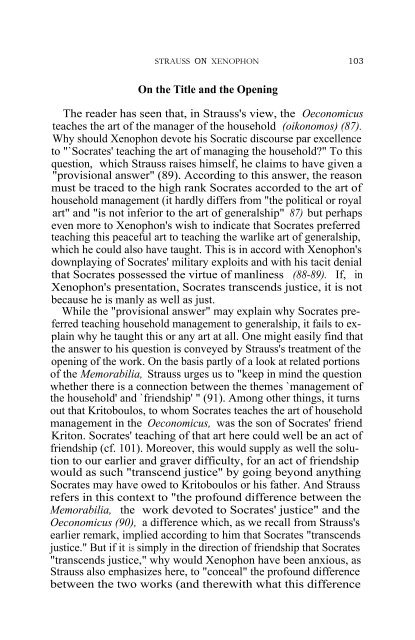Strauss on Xenophon's Socrates Xenophon's Socratic Discourse: An ...
Strauss on Xenophon's Socrates Xenophon's Socratic Discourse: An ...
Strauss on Xenophon's Socrates Xenophon's Socratic Discourse: An ...
Create successful ePaper yourself
Turn your PDF publications into a flip-book with our unique Google optimized e-Paper software.
STRAUSS ON XENOPHON 103<br />
On the Title and the Opening<br />
The reader has seen that, in <str<strong>on</strong>g>Strauss</str<strong>on</strong>g>'s view, the Oec<strong>on</strong>omicus<br />
teaches the art of the manager of the household (oik<strong>on</strong>omos) (87).<br />
Why should Xenoph<strong>on</strong> devote his <strong>Socratic</strong> discourse par excellence<br />
to "`<strong>Socrates</strong>' teaching the art of managing the household?" To this<br />
questi<strong>on</strong>, which <str<strong>on</strong>g>Strauss</str<strong>on</strong>g> raises himself, he claims to have given a<br />
"provisi<strong>on</strong>al answer" (89). According to this answer, the reas<strong>on</strong><br />
must be traced to the high rank <strong>Socrates</strong> accorded to the art of<br />
household management (it hardly differs from "the political or royal<br />
art" and "is not inferior to the art of generalship" 87) but perhaps<br />
even more to Xenoph<strong>on</strong>'s wish to indicate that <strong>Socrates</strong> preferred<br />
teaching this peaceful art to teaching the warlike art of generalship,<br />
which he could also have taught. This is in accord with Xenoph<strong>on</strong>'s<br />
downplaying of <strong>Socrates</strong>' military exploits and with his tacit denial<br />
that <strong>Socrates</strong> possessed the virtue of manliness (88-89). If, in<br />
Xenoph<strong>on</strong>'s presentati<strong>on</strong>, <strong>Socrates</strong> transcends justice, it is not<br />
because he is manly as well as just.<br />
While the "provisi<strong>on</strong>al answer" may explain why <strong>Socrates</strong> preferred<br />
teaching household management to generalship, it fails to explain<br />
why he taught this or any art at all. One might easily find that<br />
the answer to his questi<strong>on</strong> is c<strong>on</strong>veyed by <str<strong>on</strong>g>Strauss</str<strong>on</strong>g>'s treatment of the<br />
opening of the work. On the basis partly of a look at related porti<strong>on</strong>s<br />
of the Memorabilia, <str<strong>on</strong>g>Strauss</str<strong>on</strong>g> urges us to "keep in mind the questi<strong>on</strong><br />
whether there is a c<strong>on</strong>necti<strong>on</strong> between the themes `management of<br />
the household' and `friendship' " (91). Am<strong>on</strong>g other things, it turns<br />
out that Kritoboulos, to whom <strong>Socrates</strong> teaches the art of household<br />
management in the Oec<strong>on</strong>omicus, was the s<strong>on</strong> of <strong>Socrates</strong>' friend<br />
Krit<strong>on</strong>. <strong>Socrates</strong>' teaching of that art here could well be an act of<br />
friendship (cf. 101). Moreover, this would supply as well the soluti<strong>on</strong><br />
to our earlier and graver difficulty, for an act of friendship<br />
would as such "transcend justice" by going bey<strong>on</strong>d anything<br />
<strong>Socrates</strong> may have owed to Kritoboulos or his father. <strong>An</strong>d <str<strong>on</strong>g>Strauss</str<strong>on</strong>g><br />
refers in this c<strong>on</strong>text to "the profound difference between the<br />
Memorabilia, the work devoted to <strong>Socrates</strong>' justice" and the<br />
Oec<strong>on</strong>omicus (90), a difference which, as we recall from <str<strong>on</strong>g>Strauss</str<strong>on</strong>g>'s<br />
earlier remark, implied according to him that <strong>Socrates</strong> "transcends<br />
justice." But if it is simply in the directi<strong>on</strong> of friendship that <strong>Socrates</strong><br />
"transcends justice," why would Xenoph<strong>on</strong> have been anxious, as<br />
<str<strong>on</strong>g>Strauss</str<strong>on</strong>g> also emphasizes here, to "c<strong>on</strong>ceal" the profound difference<br />
between the two works (and therewith what this difference

















